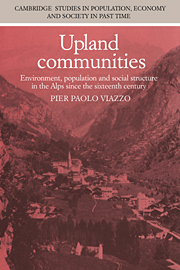 Upland Communities
Upland Communities Published online by Cambridge University Press: 13 October 2009
The question of the relations between the physical environment and human social organization is a very old one. It has fascinated many generations of scholars and stirred up acrimonious debates. And in the course of these debates, as Lucien Febvre remarked in his Geographical introduction to history, the advocates of environmental primacy have constantly placed a strong emphasis on ‘the influence of mountains on man, and the special characters which they imprint on mountain societies – characters in every respect dissimilar to those of societies on the plains, being affected by a natural environment peculiarly oppressive and tyrannical’.
This was particularly the case in the late nineteenth and early twentieth centuries, when the laudable attempt to counteract the dangers of racial determinism led some of the pioneers of human geography to espouse a no less extreme form of environmental determinism. The method associated with the names of Friedrich Ratzel and Ellen C. Semple consisted in comparing peoples of different ethnic stocks but living under analogous geographical conditions. If these peoples were found to display similar social and economic features, then it seemed legitimate to infer that such similarities were due to environment rather than to race. The fact that similarities in economic and social organization appeared to be especially marked in mountain areas was taken as evidence that virtually no alternative was available to people inhabiting regions in which the beauty of nature belies extraordinarily difficult living conditions.
To save this book to your Kindle, first ensure [email protected] is added to your Approved Personal Document E-mail List under your Personal Document Settings on the Manage Your Content and Devices page of your Amazon account. Then enter the ‘name’ part of your Kindle email address below. Find out more about saving to your Kindle.
Note you can select to save to either the @free.kindle.com or @kindle.com variations. ‘@free.kindle.com’ emails are free but can only be saved to your device when it is connected to wi-fi. ‘@kindle.com’ emails can be delivered even when you are not connected to wi-fi, but note that service fees apply.
Find out more about the Kindle Personal Document Service.
To save content items to your account, please confirm that you agree to abide by our usage policies. If this is the first time you use this feature, you will be asked to authorise Cambridge Core to connect with your account. Find out more about saving content to Dropbox.
To save content items to your account, please confirm that you agree to abide by our usage policies. If this is the first time you use this feature, you will be asked to authorise Cambridge Core to connect with your account. Find out more about saving content to Google Drive.